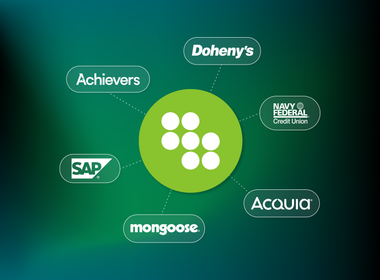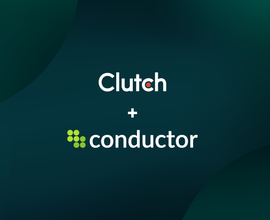6 Customer Success Stories: Winning AEO / GEO with Conductor
Six Conductor customers are dominating AI search—and the results speak for themselves. They're earning citations in Google's AI Overviews, ChatGPT, Perplexity, and Copilot, turning that visibility into real business impact: double-digit engagement improvements, higher conversion rates, and market share alongside the biggest names in their industries. Here's what they learned—and how Conductor helped them get there.
A citation in AI search is more than visibility—it’s validation.
It means an AI engine scanned the web and decided your content explains the topic best. That moment of selection becomes influence: your brand becomes the voice users see, read, and trust—positioned inside the answers that shape decisions.
We surveyed Conductor customers because we wanted to know: who's actually winning in AI search? Turns out, a lot of them are. They're landing AI Overview citations across competitive search terms, building AI visibility that traditional SEO alone can't deliver, and turning that presence into measurable traffic growth.
Some are appearing in 80+ AI search results across hundreds of prompts. Others have seen their visibility double in months. The common thread? They're not waiting around for best practices to emerge—they're building content that AI engines are designed to surface, and they're using Conductor to do it at scale.
Here's how six brands are dominating AEO / GEO—and what those wins are actually worth.
6 Conductor customers winning in AI search:
1. Navy Federal Credit Union
Navy Federal's Auto Loans page had all the right information—competitive rates, clear terms, flexible options. But the content was structured like a traditional product page, organized around what the credit union wanted to highlight rather than how people actually search for auto loans.
Conductor's conversational query analysis revealed the disconnect. People weren't searching "Navy Federal auto loan features"—they were asking specific questions:
- “Can I refinance my car loan with bad credit?"
- "Does Navy Federal require a down payment?"
- "How long does preapproval take?"
The team restructured the page around those real queries, using Writing Assistant to reshape headings and add FAQ sections that matched natural language patterns. Schema markup made those answers even easier for AI engines to parse and cite.
The results showed up fast. ChatGPT, Copilot, and Perplexity began citing the page for auto loan queries, and Conductor's analytics connected those AI citations directly to an 18% increase in page sessions and higher engagement with rate calculators and preapproval tools. The page wasn't just getting visibility—it was driving the actions that matter most to a lender.
The results:
- 18% increase in page sessions and higher engagement with calculators and rate tools
- Noticeable increase in AI-driven referral traffic and visibility
- Improved brand authority as a trusted financial source across AI search platforms
- Appears frequently in ChatGPT, Copilot, and Perplexity results for auto loan–related queries
2. Acquia
When Acquia published an article on "7 Key Web Governance Principles ," the goal was to establish authority on a niche but important topic for their audience. The article quickly gained traction, earning citations in Google's AI Overview results and Perplexity for "web governance" queries—even appearing alongside Wikipedia as a top reference.
But the team didn't treat that initial success as the finish line. They knew AI search was evolving constantly, with algorithms adjusting what they surfaced and new content competing for citations daily. Conductor became their monitoring system, revealing which sections of the article were being cited most, which related queries were gaining traction, and where opportunities existed to strengthen coverage. When the data showed "web governance standards" trending, Writing Assistant helped expand that section with clearer structure and richer context.
That ongoing optimization paid off. The article has maintained its #1 placement in Google's AI Overview while generating over 100 AI-driven clicks in 90 days, expanding its reach as AI search evolved rather than fading into the background.
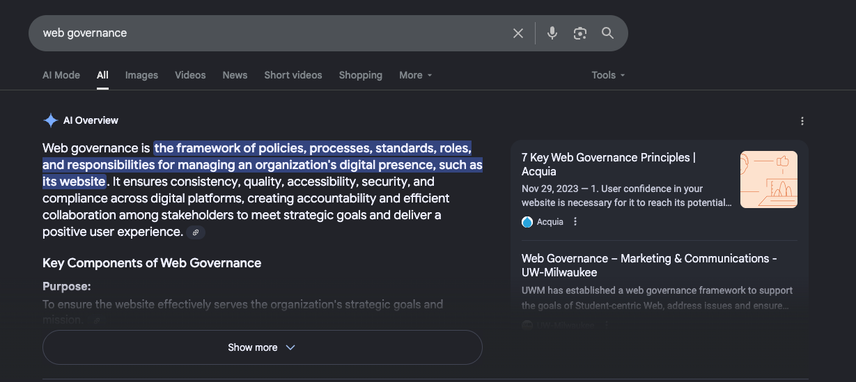
The results:
- Earned #1 placement in AI Overview result and 100+ AI-driven clicks in 90 days
- Cited in Google’s AI Overview and Perplexity for web governance-related queries
- Boosted visibility for accessibility and governance topics
- Reinforced Acquia’s authority as a leader in inclusive digital experiences
3. SAP
SAP faced a problem most B2B tech companies know well: their expertise is what sets them apart, but that same depth makes content hard for AI to parse and cite. Specifically SAP’s "What Is Master Data Management (MDM) " page needed to work for two audiences—C-suite buyers evaluating solutions and AI engines deciding what to surface.
Conductor's insights revealed the disconnect. The page was technically accurate but structured for people who already understood MDM. Writing Assistant helped SAP rebuild it around the questions buyers actually ask first: "What problem does this solve?" and "Why does my business need it?"
The team front-loaded clarity without dumbing down the expertise, giving AI engines the context they needed to confidently cite SAP for queries like "what is master data management" and "MDM software."
The win wasn't just visibility—it was positioning. By appearing in ChatGPT, Perplexity, and Copilot for foundational MDM queries, SAP became the entry point for buyers starting their research, not just an option they'd discover later.
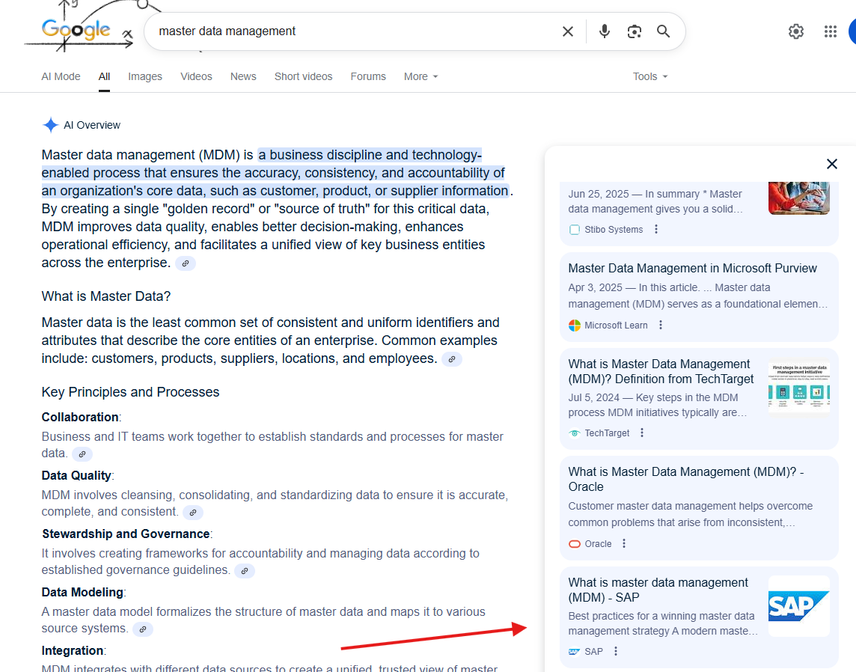
The results:
- Appears in ChatGPT, Perplexity, and Copilot for MDM-related definitions and comparisons
- Increased visibility, impressions, and engagement on key MDM pages
- Drove greater awareness of SAP’s Data Cloud solutions through AI search discovery
4. Mongoose
Mongoose wanted to build visibility in the mountain biking space, but breaking through against established outdoor brands was proving difficult—until they discovered a smarter approach. Conductor's Keyword Research revealed a niche topic with real opportunity: beginner trail etiquette had strong search intent but surprisingly few quality guides addressing it. While other brands focused on gear and advanced techniques, new riders were searching for something more fundamental—the social rules that would help them feel confident on the mountain.
The team created "10 Mountain Biking Etiquette Tips for New Riders " with Writing Assistant, structuring it for how beginners actually consume advice: scannable, conversational, and practical enough to reference at a trailhead. The content addressed real anxieties—what to do when faster riders approach, how to share narrow trails, when to yield—in a welcoming, approachable way.
That focus paid off. ChatGPT now cites Mongoose alongside REI and USA Cycling for trail etiquette queries, putting the brand in front of first-time riders at exactly the moment they need guidance.
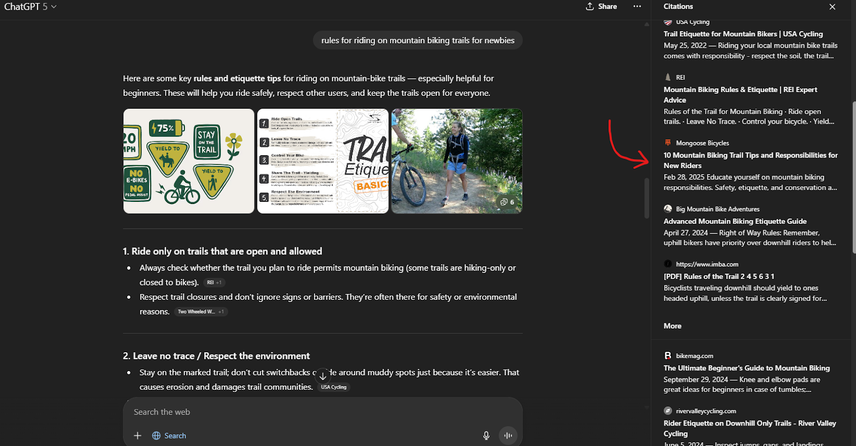
The results:
- Featured in ChatGPT alongside key competitors for trail etiquette–related queries
- Increased traffic and engagement on the brand’s DTC site
- Expanded authority in the mountain biking space through educational content
- Earned new visibility across AI-driven search experiences
5. Doheny’s
Most eCommerce brands treat product pages like spec sheets. Doheny's saw them differently—as opportunities to answer the questions shoppers ask before they buy. Now when someone asks ChatGPT or Gemini "best pool safety covers for irregular pools" or "mesh vs. solid pool covers," Doheny's 15-Year Mesh Safety Cover shows up as the recommended solution.
The challenge with product pages? They're built for conversionConversion
Conversions are processes in online marketing that lead to a defined conclusion.
Learn more, not conversation. Conductor helped Doheny's bridge that gap by revealing which product attributes actually drove purchase decisions in search queries—not just features like "15-year warranty," but questions like "will this work for my L-shaped pool?" Writing Assistant helped reframeFrame
Frames can be laid down in HTML code to create clear structures for a website’s content.
Learn more technical specs into answers that felt helpful rather than salesy.
The payoff showed up where it matters most for eCommerce: on-page behavior. Users weren't just landing on the page—they were engaging with comparison tools, exploring sizing calculators, and converting at higher rates than traffic from traditional search.
The results:
- Cited in ChatGPT and Gemini for pool safety and product comparison queries
- Significant increases in organic traffic and impressions from long-tail, conversational searches
- Higher on-page engagement, with users spending more time exploring comparison and sizing tools
- Stronger conversion rates and brand awareness
6. Achievers
Creating a comparison article that includes your own product is tricky—do it wrong and it reads like a thinly veiled sales pitch. Achievers needed their "Top Employee Recognition Platforms " guide to be genuinely useful to HR leaders evaluating options, which meant being objective enough that AI engines would trust it as a credible source.
Conductor helped Achievers walk that line. Writing Assistant surfaced the specific comparison criteria decision-makers cared about most—integrations with existing HR systems, mobile accessibility, peer-to-peer recognition features—so the team could structure the article around real evaluation factors rather than marketing messaging. Google's AI Overview now cites the article across multiple employee recognition themes, positioning Achievers as a knowledgeable voice in the category, not just another vendor.
That credibility translates to something even more valuable than visibility: Achievers now enters the consideration set during the research phase, before buyers have locked into a shortlist.
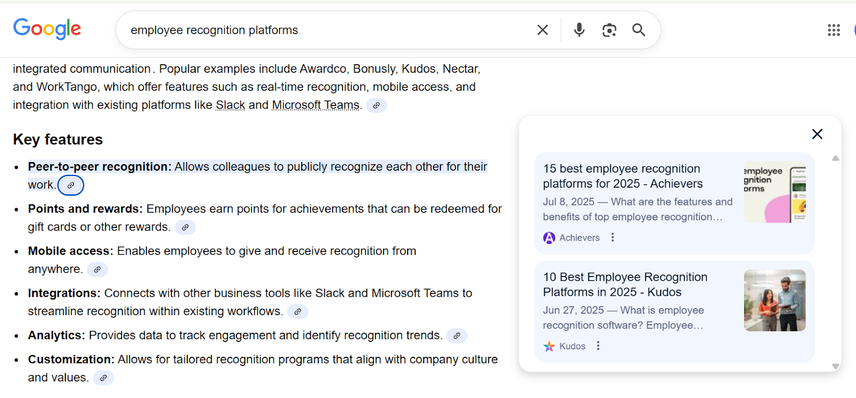
The results:
- Cited in Google’s AI Overview across multiple employee recognition themes
- Boosted impressions and visibility for key HR software search terms
- Strengthened authority and brand presence within the employee engagement space
In summary
These six brands are proving what success in AEO really looks like. They’re earning citations in Google’s AI Overviews, Perplexity, and ChatGPT—and turning those mentions into measurable growth: more qualified traffic, stronger engagement, and higher conversions.
They’ve figured out what AI search rewards—content that’s clear, structured, and genuinely helpful—and they’re applying that formula across their digital ecosystems. With Conductor, they can see how their content performs in AI results, identify the pages being cited, and optimize around what’s working. The result is a repeatable system for visibility and credibility in a new era of search.
This is what’s next: brands using data, not guesswork, to understand how AI finds and features their content—and acting on those insights to grow AEO / GEO market share faster.
